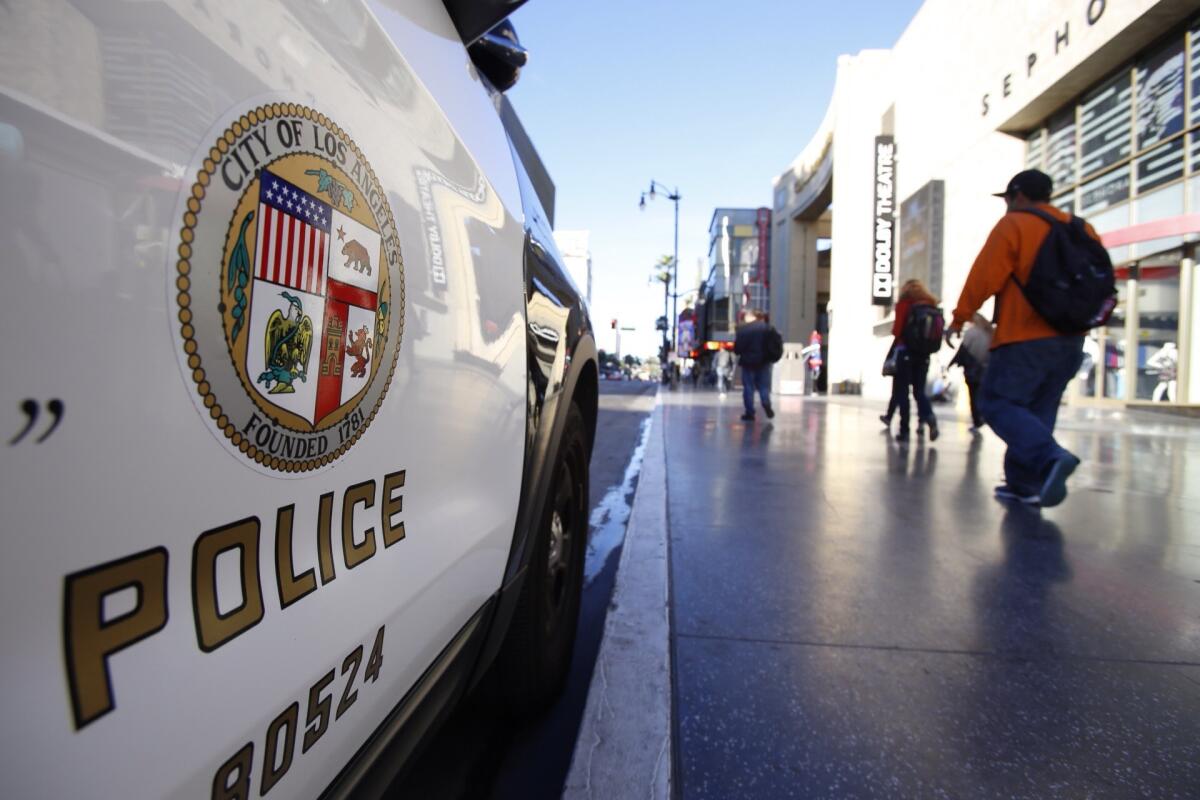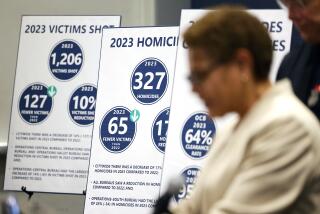Crime falls sharply in March due to coronavirus restrictions, LAPD and sheriff report

- Share via
Crime in Los Angeles fell sharply in March as the city imposed strict new rules on residents and businesses to slow the spread of the coronavirus.
Violent offenses in the city dropped 14% and property crime declined 12% through March 25 compared with the same period last year, according to figures from the Los Angeles Police Department. The department had reported single-digit reductions before this month.
Homicides have dropped slightly so far this month from 15 to 12, department figures show. Robberies were down 22% along with an 11% decrease in aggravated assaults. Meanwhile, thefts fell 18% and burglaries were down 7%. The only categories to see increases were vehicle theft, up 10%, and rape, which ticked up 2% during that time.
The downward trend occurred as Mayor Eric Garcetti ordered nonessential businesses to shut down and told residents to stay home.
L.A. County imposed similar restrictions, and the Sheriff’s Department also reported a drop-off in crime.
LAPD Assistant Chief Robert Arcos said criminal activity is declining as fewer people venture out of their homes to shop or visit bars and restaurants.
“Suspects for the most part are opportunists and they are looking at those locations, looking for that activity and looking for that victim,” said Arcos, who heads the department’s patrol operations. “When you remove those things from that equation, it’s not surprising to start to see these types of decreases.”
It’s a unique moment for policing in L.A., he said. The only comparable times Arcos could recall were the aftermath of the 1994 Northridge earthquake and when thousands of military troops were sent to the city to quell violence and looting during the 1992 riots.
“It’s at the top of list for being unprecedented,” said Arcos, a 32-year veteran with the department.
In areas patrolled by L.A. County deputies, violent offenses have dropped 10% and overall crime has fallen 6% so far this year compared with last year, according to Sheriff Alex Villanueva. The nation’s largest sheriff’s department had reported small declines before this month.
But Villanueva said he worries that domestic abuse incidents may increase as the outbreak continues.
“With so many people living in cramped, close quarters with nothing to do and nowhere to go — that will be a challenge,” he said. “We exhort everybody who is at home to reach out, use a phone, use a computer and find ways to interact with others and alleviate some of the tension and boredom that can set in.”
Peter Moskos, criminology professor at John Jay College of Criminal Justice in New York, likened the current situation to how inclement weather typically leads to less criminal activity.
“If you are inside you’re not going to get robbed on the street, it’s really that simple,” Moskos said. “Everyone hunkered down at home is going to lower the crime rate.”
Arrests by LAPD officers dropped 14% the first half of March compared with the same period last year, The Times reported last week.
Moskos said a decline in arrests will probably result in fewer recorded incidents because many crime statistics are compiled from arrest records. And officers may be more hesitant to make arrests because it requires close contact with a suspect, he said.
“Cops are worried about catching the bug and bringing it back home. They are trying to practice social distancing as much as everyone else. That changes policing because certainly arrests are a hands-on job,” Moskos said.
So far, 15 LAPD officers have tested positive for the virus, including four members of the senior command staff, according to the department.
Arcos said officers are trained in how to deal with people who have communicable diseases and have personal protective equipment and testing available. Still, officers are rightfully concerned about their own safety and their loved ones’, he said.
“I think that’s something that weighs on them. What could happen to their families when they come home from work? Could they potentially have been exposed? Those are all realistic questions that they have to work through,” Arcos said.
“It’s in the back of their minds just like anyone else who is going through this and it is creating different degrees of anxiety.”
More to Read
Sign up for Essential California
The most important California stories and recommendations in your inbox every morning.
You may occasionally receive promotional content from the Los Angeles Times.











